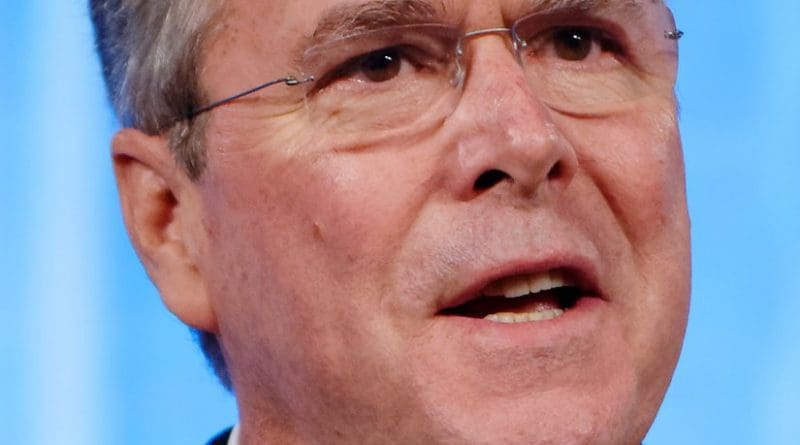Can Slow And Steady Jeb Bush Win GOP Nomination? – Analysis
By Observer Research Foundation
By Sylvia Mishra*
Jeb Bush, the former Governor of Florida, Spanish-speaking political scion, formally entered the US Presidential race on 15 June, formally saying “America Deserves Better“. The major thrust of the Republican’s campaign agenda so far has been a balanced mix of bridging income inequality, promoting free trade and highlighting America’s need for greater engagement with the world.
Hailing from a family of two former US presidents, Jeb Bush carries with him, for good or bad, plenty of family baggage. However, he has mentioned on several occasions “I am my own man” and that his family name has given him no unique claim to the Oval Office. So far, Jeb Bush has been vigorously campaigning, strengthening his super-PAC and has been able to establish himself as an accomplished candidate for the GOP presidential nomination. An average of three polls — CNN/ORC, Fox News and Rasmussen — by Real Clear Politics has shown that Jeb Bush approval ratings have registered a steady lead through the months of April to July. However, Donald Trump’s candidature has led to a sharp decline in Jeb Bush’s popularity ratings. Jeb Bush has called himself a “joyful tortoise“in the face of Donald Trump’s meteoric rise. Does a “slow and steady” Jeb Bush have what it takes to win the GOP presidential nomination?
What would possibly set Jeb Bush apart from the other GOP presidential nomination seekers is his ability to craft a campaign agenda which enables America to gain back the lead in the economic sphere, develop programmes that are inclusive of social issues, and a more realistic and less idealistic approach to America’s foreign policy engagements. As the security threat situation has dramatically changed since 2008 and 2012, the upcoming US Presidential elections of 2016 mandates that American leadership lays a thoughtful roadmap which upholds America’s strategic long-term interests. Another important factor which would be critical for a successful Republican party’s front-runner candidate would be his ability to frame policies which to a great extent would be bipartisan in nature. Over the past few years, American politics and especially foreign policies have been hugely partisan, often leading the international community to view American foreign policy unfavourably. Jeb Bush’s ability to sound like a president who once elected would be willing to follow the consensus-building model of reaching across the aisle would greatly consolidate his position as the Republican presidential candidate.
Economic policies play a pivotal role in electoral politics. Jeb Bush has promised that once elected he would deliver a 4% annual economic growth rate. During his term as the Governor of Florida (1997-2007), he had an impressive economic record as he balanced the state’s budget and registered one of the fastest job growth rates. However, the soundness of his economic policies has been questioned by economists. Several have contended that the 4% growth rate during Jeb Bush’s time is due to Florida’s vibrant demographics which support a rapidly expanding pool of workers.Paul Krugman stated that Jeb Bush’s economic policies reflect self-aggrandisement because Florida’s boom was due to the “housing bubble” and when the bubble burst the state plunged into a deep slump. Being a stern fiscal and social conservative, Jeb Bush has principally been a spokesperson for the large section of pro-business wing. On the campaign trail, Jeb Bush hasn’t laid out an economic growth plan and has given extremely sketchy details of how he intends to introduce pro-growth policies that would support workers to find jobs.
On the foreign policy front, a major thrust of Jeb Bush’s campaign has been to go on the offensive, accusing the incumbent administration under President Obama and his first secretary of state, Hillary Clinton, of America’s disengagement with the world, thereby emboldening America’s foes. Under a Jeb Bush presidency, he promises that America would be in a position to project power and establish peaceful stability in far-off areas across the globe. Bush’s underlying understanding regarding war efforts emanates from the Republican conservative idea that that the world is a safer place when America engages. However, he hasn’t been specific regarding what entails America’s foreign engagements aside from strengthening the US military and forging relationship with allies. On his approach to solving the Middle East quagmire, he has stated in an opinion article in National Review that the Iran deal would allow Iran to intimidate the Middle East and the US needs to coordinate better with the Iraqi government and military to embed US trainers with Iraqi trainers. While the foreign policy agenda of Jeb Bush has certainly been hawkish, it is important to note that during the primary election campaigns, presidential candidates usually tend to take positions that are either more right/left of the political spectrum to win over the base voters. Usually once the candidates have won their party’s nomination, they tend to take positions which are more centrist.
The super-PAC backing former Florida governor Jeb Bush has reportedly raised an impressive $103 million that will enable him to launch a robust campaign. In the present situation, it would bode well for Jeb Bush’s election campaign if he is able to minimise the scale of controversies such as the “anchor babies” — an idea which is centred on the assumption that having an American-born child can protect undocumented people from deportation. Negative campaigns have previously worked against presidential candidates and he would do well by refraining from statements that could be construed as racist.
*The writer is a Junior Fellow at Observer Research Foundation, Delhi
Courtesy: www.huffingtonpost.in

